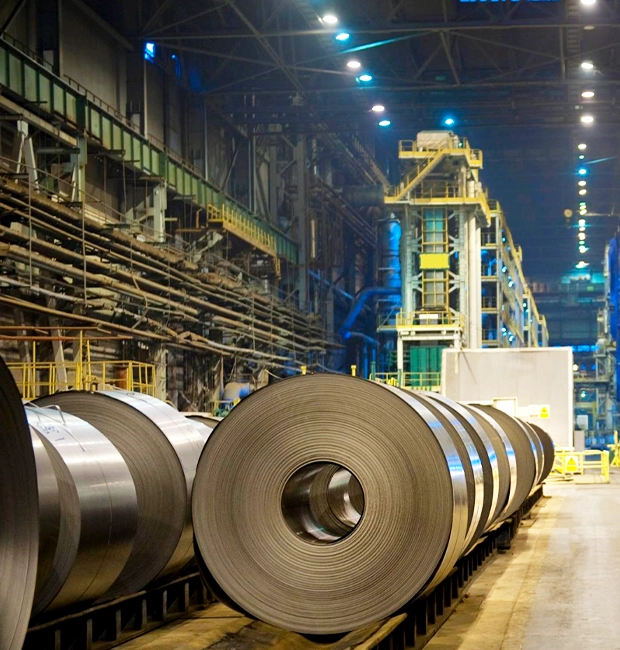
Cold-rolling mills play a crucial role in the steel industry, producing high-quality sheets from hot-rolled steel. Unlike a hot roll, a cold roll achieves its thickness and finish by rolling at room temperature, requiring extreme precision. Among its products are AC drives, DC drives, PLC systems,, and control panels from Fuji Gemco, a joint venture between Fuji Electric and Gemco Controls. By using these technologies, cold rolling mills can operate at an unmatched level of efficiency and accuracy.
Cold-rolling mills process hot-rolled steel coils at room temperature to reduce thickness, improve surface quality, and enhance mechanical properties. The process involves passing steel through rollers, often in 4-Hi or 6-Hi configurations, to achieve precise dimensions and a smooth finish. The result is steel used in high-demand applications like automotive panels, consumer electronics, and construction materials.
Why is automation critical? Cold rolling requires tight control over variables like roller pressure, speed, and material tension. Manual systems can’t deliver the consistency needed by modern standards. Fuji Gemco’s automation solutions, built on decades of expertise, ensure mills produce high-quality steel with minimal waste and downtime.

Cold rolling offers unique advantages for steel production. Here are three key benefits:
Produces smooth, polished surfaces ideal for high-end applications.
Cold working increases steel’s strength and durability.
Achieves tight tolerances for consistent product quality.
Automation is the backbone of modern cold rolling mills, replacing manual adjustments with real-time precision. Fuji Gemco’s solutions streamline every process stage, including AC drives, DC drives, PLC automation, and control panels. From maintaining uniform thickness to optimizing energy use, these systems ensure mills meet the stringent demands of industries like automotive and electronics.
Automation drives efficiency and quality in cold rolling mills. Here are five reasons why it’s essential:
Fuji Gemco combines Fuji Electric’s global innovation with Gemco Controls’ deep knowledge of the Indian market to deliver custom automation for cold rolling mills. Their systems are designed to handle the unique challenges of cold rolling, such as maintaining tight tolerances and ensuring smooth material flow.
Fuji Gemco’s product lineup is built for precision and reliability. Here are seven core technologies they offer:
Fuji Gemco’s solutions incorporate advanced features to address cold rolling mill needs. Here are nine ways their systems matter:
Cold rolling mills face unique challenges, from achieving ultra-thin gauges to managing high energy costs. Fuji Gemco’s automation systems tackle these issues, delivering measurable performance and cost-efficiency improvements.
Common Challenges in Cold-Rolling
Here are five challenges cold rolling mills encounter:
Fuji Gemco’s systems address these challenges with precision and efficiency. Here are seven solutions they provide:
Fuji Gemco has a proven track record of transforming cold rolling mills across India. Their solutions have been deployed in major steel plants, delivering tangible results in quality and efficiency.
Here are three examples of Fuji Gemco’s impact on cold rolling mills:
Fuji Gemco is a trusted partner for cold rolling mills, offering reliable, scalable, and customized automation solutions. Their expertise, backed by Fuji Electric’s global innovation and Gemco Controls’ local insights, ensures mills achieve peak performance.
As the industry moves toward smarter, greener production, Fuji Gemco’s innovative solutions position it as a leader in the steel industry.
Cold rolling mill automation involves controlling metal processing at room temperature using precise AC/DC drives and PLC systems to achieve dimensional accuracy and surface finish.
Cold rolling requires tighter control over thickness and finish, while hot rolling focuses on deformation at high temperatures.
Fuji Gemco delivers advanced drive systems and process automation with proven results across Indian and global cold rolling facilities.
It improves thickness control, reduces manual error, enhances product consistency, and increases mill uptime.
DC drives are commonly used for precision control; however, Fuji Gemco also offers energy-efficient AC drive systems.
They ensure centralized control, real-time monitoring, and fault diagnostics, boosting operational reliability.
Yes. Fuji Gemco provides custom retrofitting solutions to automate legacy cold rolling setups.
Precise synchronization between mill stands is crucial for uniform thickness and smooth material flow.
Yes. With decades of experience and Japanese technology integration, Fuji Gemco is a top automation provider in this sector.